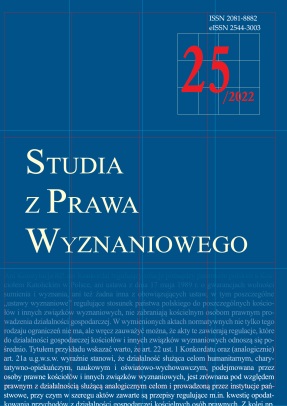Wolność religijna i stosunek państwa do wspólnot religijnych w konstytucjach wybranych państw muzułmańskich
Religious freedom and the state’s attitude to religious communities in the constitutions of selected Muslim countries
Author(s): Katarzyna Krzysztofek-StrzałaSubject(s): Law, Constitution, Jurisprudence, Constitutional Law, Human Rights and Humanitarian Law, Sharia Law
Published by: Katolicki Uniwersytet Lubelski Jana Pawła II - Wydział Prawa, Prawa Kanonicznego i Administracji
Keywords: Sharia law; constitution; religious freedom; Muslim countries; confessional state
Summary/Abstract: The aim of this paper is to analyze the provisions of the constitutions of twenty-one states in which Islam is practiced by the majority of the population, although it is not necessarily recognized as the state religion. The author examines the connection between the scope of individual and collective religious freedom and the type of relations between the state and religious organizations, taking as a point of reference the distinction between confessional and secular states. The comparative analysis shows that the scope of religious freedom guaranteed in individual states tends to vary and does not fully depend on the adopted model of relations with religious organizations. Moreover, there is no direct relationship between the number of Muslims living in a given country and the type of these relations. It is also argued that the division of confessional states into closed and open variants is of limited usefulness, as it does not reflect the diversity of the regulations on religious freedom adopted in the constitutions of the analyzed states.
Journal: Studia z Prawa Wyznaniowego
- Issue Year: 2022
- Issue No: 25
- Page Range: 171-193
- Page Count: 23
- Language: Polish

